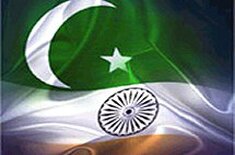At Istanbul, India tried to scuttle Pakistan’s proposal for peace in Afghanistan by making counterproductive suggestions. Earlier, Hamid Karzai also attempted back stabbing by signing an agreement with India for training Afghan forces. However, either it is naïveté or sheer skullduggery that Pakistan is agreeing to all Indian proposals without demanding anything in return like resolving the long outstanding Kashmir issue.
By S. M. Hali
Pakistan is bending backwards to appease India and make friends with it. We are mercurial in our behavior as a nation; either we hate fervently or love ardently; there is no middle of the road for us. Prime Minister Syed Yousuf Raza Gilani, during the concluding session of the Commonwealth Heads of Government Meeting, supported and seconded India's proposal for a four year extension in the term of Kamlesh Sharma as Secretary General of the Commonwealth. Gilani rationalized that the move was in reciprocation for India's backing of Pakistan in recent elections for a non-permanent slot in the UN Security Council. Syed Yousuf Raza Gilani forgets that India’s vote for Pakistan came in the backdrop of Pakistan backing India in the same forum last year. If that were not enough, Pakistan returned an Indian Army helicopter along with its crew within four hours of violating Pakistan’s airspace last month despite India having shot down PN’s Atlantique aircraft within Pakistani territory in 1999.
Pakistan has taken a giant leap of faith by granting Most Favored Nation (MFN) status to India. Syed Yousuf Raza Gilani confirmed the decision after a meeting with Dr. Manmohan Singh during the SAARC Summit at Maldives . India has been aspiring to achieve this status, whose pros nor cons have been thought through by Pakistan nor proper infrastructure with private sector participation been placed at Wagah border or a Container yard established, nor loading and unloading space expanded, or a full-fledged online banking facility , quarantine department and other labs set up. Trade balance is already in India ’s favour due to non-tariff barriers. India granted the MFN status to Pakistan, to comply with the principles of World Trade Organization (WTO) regime in 1995, and Pakistan’s reluctance in reciprocating so far was consequential owing to trade imbalance reservations . India had been insisting that increased trade relationship can play a vital role in normalizing the political relationship between the two countries, brushing the Kashmir issue under the carpet. It is distressing that reportedly at the behest of India, Bangladesh appealed the WTO not to grant Generalized System of Preferences (GSP) to Pakistan, as it would affect its textile export to the European Union and other European countries. Bangladesh made a petition to the WTO on the issue, expressing the fear that country like Bangladesh would be badly affected if the proposed GSP facility was granted in favour of Pakistan. This move is akin to stabbing Pakistan in the back but Pakistani leadership is oblivious to conspiracies being hatched against it and is bent upon following the US diktat to improve ties with India. There are rumors in the Indian social media that palms were greased to ensure that India is granted MFN status.
During the recent regional countries conference at Istanbul, India tried to scuttle Pakistan’s proposal for peace in Afghanistan by making counterproductive suggestions. Earlier, Hamid Karzai also attempted back stabbing by signing an agreement with India for training Afghan forces. However, either it is naïveté or sheer skullduggery that Pakistan is agreeing to all Indian proposals without demanding anything in return like resolving the long outstanding Kashmir issue. It may be recalled that since its inception in 1947 Pakistan has taken several such magnanimous decisions. It accepted a ceasefire in Kashmir in 1948 because India promised to abide by UN Resolution to hold a plebiscite in Kashmir, which in the past six and a half decades, Indian armed forces have trampled under their boots. In 1958, Pakistan, took another magnanimous decision to solve the issue of India stealing Pakistan’s river waters and signed the Indus Waters Treaty with India under the umbrella of the World Bank and USA. This treaty was signed in 1960 through which Pakistan lost waters of the Sutlej, Beas and Ravi, to India, though these rivers were already allotted to Pakistan in the Radcliff Award in 1947. With the signing of the Indus Waters Treaty, Pakistan hoped that the regional water issue of the Indus River system would be solved forever. However, this did not happen. Since then several violations of the treaty have been committed by India, including Sallal hydroelectric project, Wullar barrage project, Baglihar hydroelectric project, Kishanganga hydroelectric project and release of floodwaters in the Ravi and the Sutlej. The issues of Siachen and Sir Creek are also pending settlement but we have chosen to adopt a course of self destruction by courting India one-sidedly. A financially stressed country like Pakistan needs to look before it leaps rather than make peace overtures to India.
Courtesy: Opinion Maker.
Disclaimer: The views expressed in this article are the sole responsibility of the author and do not necessarily reflect those of the SPY EYES Analysis and or its affiliates. The contents of this article are of sole responsibility of the author(s). SPY EYES Analysis and or its affiliates will not be responsible or liable for any inaccurate or incorrect statements and or information contained in this article.

Comments
Post a Comment